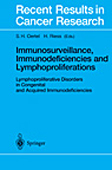This book covers lymphoproliferative disorders in patients with
congenital or acquired immunodeficiencies. Acquired
immunodeficiencies are caused by infections with the human
immunodeficiency virus or arise following immunosuppressive therapy
administered after organ transplantation or to treat connective
tissue diseases such as rheumatoid arthritis. It was recently
discovered that various diseases or therapeutic modalities that
induce a state of immunosuppression may cause virally driven
lymphoproliferations. This book summarizes for the first time this
group of immunodeficiency-associated lymphoproliferations.
차 례
From the contents: Immunosurveillance, immunodeficiency and
lymphoproliferations.- Clinicopathological characteristics of post-
transplant lymphoproliferative disorders (PT-LPD).- Iatrogenic
lymphoproliferative disorders in non-transplantation settings.- The
role of Kaposi's sarcoma-associated herpesvirus (KSHV/HHV-8) in
lymphoproliferative disorders.- Dendritic cells for the induction of
Epstein-Barr virus (EBV) immunity.- NF-kB inhibition in EBV-
transformed lymphoblastoid cell lines.- EBV viral load in patients as
a tool to diagnose and monitor PT-LPD.- The role of immunosuppression
in lymphoma.- Identification of prognostic factors in PT-LPD.-
Methods and objectives of a large US multi-center case-control study
of PT-LPD in renal transplant patients.- Antiviral treatment of EBV-
associated lymphoproliferations.- Low-dose chemotherapy for children
with PT-LPD.- Engineered antibody for treating lymphoma.- Treatment
of post-transplant lymphomas with anti-B-cell monoclonal antibodies.


